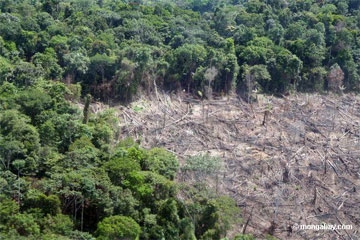Forests face governance challenges
Forests face governance challenges
mongabay.com
June 12, 2008
When it comes to forest resources, ownership does not mean governance.
|
|
Governments “own” about 86 percent of the word’s forests, but recent changes in forest management structure means they effectively control far less than they did just a generation ago. As such, the fate of forests is increasingly determined by concessionary agreements with extractive industries and the whims of market demand for commodities produced on forest lands. Climate change and rapid economic growth are poised to further complicate effective management of forest areas.
Writing in Science, Arun Agrawal and colleagues argue that understanding the factors that lead to effective governance — rather than explicit ownership of forest land — will be critical to addressing future governance of forest resources. In the face of decentralization of forest management, logging concessions in publicly owned forests, and timber certification initiatives, they recommend a greater role for community and market actors in determining and managing forest use. Agrawal and colleagues say the transition will need to involve the many stakeholders with interests in forest resources.

Deforestation in Peru |
“There is only partial knowledge about the relationships between the condition of forests, different forms of forest ownership, and the multiple objectives of forest governance—improvements in income, livelihoods, biodiversity, carbon sequestration, and ecosystem service provision. The need to look deeper, therefore, into how governance arrangements work is paramount if forest dwellers, users, managers, and policy-makers are to make better choices about forest governance at a variety of scales. ”
“A very large number of factors influences the effectiveness and outcomes of forest governance,” the authors continue. “Among these, careful definition of user rights and responsibilities in forests, greater participation by those who use and depend on forests, downward and horizontal accountability of decision-makers, better monitoring of forest outcomes, stronger enforcement of property rights and governance arrangements, and investments in institutional capacities at local, regional, and national levels have been identified as critically important for more effective forest governance in tropical country contexts.
Agrawal and colleagues say that better governance will help ensure that forests are around to meet the needs of future generations.
“Broadly speaking, the goal of forest conservation has historically not been met when in conflict with land use changes driven by the demand for food, fuel, and profit,” write the authors. “It is necessary to recognize and advocate for better governance of forests more strongly given the importance of forests in meeting basic human needs in the future, making resources available for livelihoods and development, maintaining ecosystems and biodiversity, and addressing climate change mitigation and adaptation goals. Such advocacy must be coupled with financial incentives for governments of developing countries and a greater governance role for civil society and market actors if forests are to continue to provide benefits to humans well into the future.”
Arun Agrawal, Ashwini Chhatre, Rebecca Hardin (2008). Changing Governance of the World’s Forests. 13 JUNE 2008 VOL 320 SCIENCE